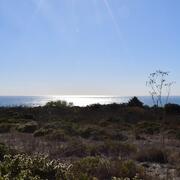...to informing restoration efforts in the Florida Everglades
...to tracking storm-related flood conditions through the South Atlantic...
...to investigating coral health in the Florida Keys & Caribbean...
...to assessing environmental contaminants on aquatic life in the Mississippi River Basin...
...USGS science spans the South Atlantic, Gulf States and Caribbean
The Southeast Region includes 13 states and two U.S. territories, Puerto Rico and the U.S. Virgin Islands
The Southeast Region includes 13 states and two U.S. territories, Puerto Rico and the U.S. Virgin Islands
Southeast Region
We conduct impartial, multi- and interdisciplinary research and monitoring to address a broad range of natural-resource issues that affect the quality of life of citizens and landscapes in the Southeastern United States and the Caribbean region.
News
AquaDePTH: Merging Aquatic Disease Surveillance Data into One Useful Tool
AquaDePTH: Merging Aquatic Disease Surveillance Data into One Useful Tool
USGS Geologic Mapping Project Supports Critical Mineral Exploration, Enhances Public Safety in the Southeast
USGS Geologic Mapping Project Supports Critical Mineral Exploration, Enhances Public Safety in the Southeast
Ecological Thresholds, Abiotic Stress, and Climate Change: A Conceptual Framework
Ecological Thresholds, Abiotic Stress, and Climate Change: A Conceptual Framework
Publications
Erosion potential and flood vulnerability of streams and stream crossings at Acadia National Park, Maine Erosion potential and flood vulnerability of streams and stream crossings at Acadia National Park, Maine
Acadia National Park has had increases in the frequency and magnitude of precipitation in recent years, leading to increased flood flows, stream erosion, and costly infrastructure damage. To improve infrastructure management in a changing climate, the U.S. Geological Survey, in cooperation with the National Park Service, has developed multiple datasets that can help natural resource...
A tool to monitor hydrologic conditions on tree islands in the Everglades A tool to monitor hydrologic conditions on tree islands in the Everglades
Tree islands are patchy upland forested habitats in Florida's Everglades that face degradation and disappearance due to altered hydrologic patterns. The U.S. Geological Survey coordinated with the Miccosukee Tribe of Indians of Florida and the Seminole Tribe of Florida to co-develop a decision-support tool based on tree-island hydrologic conditions. Everglades managers can use this tool...
Future aquatic invaders of the Northeast U.S.: How climate change, human vectors, and natural history could bring southern and western species north Future aquatic invaders of the Northeast U.S.: How climate change, human vectors, and natural history could bring southern and western species north
As environmental conditions change, land managers are increasingly concerned about the potential for new aquatic invasive species to move into their jurisdictions. Because managers may have limited resources, detecting invasive species early is important as prevention is more effective and less costly than ongoing mitigation of established populations. Tools built to assist early...
Science
Mobile River Basin Study
The Mobile River Basin in Alabama, Georgia, Mississippi, and Tennessee is one of the 59 study units that are part of the U.S. Geological Survey's National Water-Quality Assessment (NAWQA) Program. The long-term goals of this program are to describe the status and trends in the quality of a large, representative part of the Nation's surface- and ground-water resources, and to provide a sound...
Where Land Meets Sea: USGS Science for Resilient Coastal Habitats
USGS coastal science plays a critical role in supporting the effective, science-based management of coastal ecosystems, where the biodiversity of land and sea meet. It provides managers with the information they need to make sound decisions. Through cutting-edge research, predictive modeling, and decision-support tools, USGS empowers resource managers to make informed, science-based choices. From...
By
Ecosystems Mission Area, Land Management Research Program, California Water Science Center, Eastern Ecological Science Center, Forest and Rangeland Ecosystem Science Center, Lower Mississippi-Gulf Water Science Center, Pacific Coastal and Marine Science Center, Western Ecological Research Center (WERC), Western Fisheries Research Center, Western Geographic Science Center, Wetland and Aquatic Research Center
Groundwater Monitoring Program for the Brunswick-Glynn County Area, Georgia
In the Brunswick, Georgia area, saltwater has contaminated the Upper Floridan aquifer for nearly 50 years. Saltwater contamination has constrained further development of the Upper Floridan aquifer in the Brunswick area, which has stimulated interest in the development of alternative sources of water supply, primarily from the shallower surficial and Brunswick aquifer systems. USGS is working...




